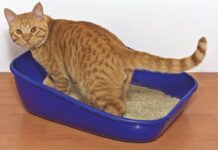Can my cats get the flu from me, or can I get the flu from my cats?
The short answer is no. None of the currently known strains of flu (influenza) virus are transmissible between cats and people. But influenza viruses are by nature very changeable, so the longer answer is a touch more complex. At the end of this column Ill suggest a safeguard to prevent cats from becoming infected (although it would be extremely rare for that to happen in the first place), but first were going to have to talk about birds.
Avian influenza
There are three types of influenza viruses: A, B and C. Well only talk about type A viruses, because they have the most significant implications for human and animal health. There are many subtypes and countless strains of influenza A viruses, but all of them can infect birds (wild waterfowl and migrating birds are the natural hosts), so theyre commonly called avian influenza viruses. These viruses vary tremendously in their ability to cause disease, and, depending on the subtype and strain, they sometimes even jump species and infect other animals, including humans.
Health officials in the U.S. carefully monitor avian influenza outbreaks in domestic birds because of the concern that viruses with low ability to cause disease in birds – so-called low-pathogenic viruses – might evolve into highly pathogenic forms. Highly pathogenic avian influenza viruses spread rapidly and can necessitate the destruction of entire flocks; such losses, along with the resultant trade restrictions, have a tremendous economic impact on the poultry industry. But monitoring is also important because of the possibility that a particular avian influenza virus could directly infect people or evolve into an even more dangerous virus by gen- etically mixing with ordinary human influenza viruses.
Infected wild birds dont usually get sick. But they can spread virus to chickens, with devastating results. A highly pathogenic avian influenza virus (the H5N1 subtype) has resulted in the death of at least 100 million domestic fowl in eight Asian countries. Of even greater concern is that humans also became infected with H5N1 during these outbreaks. Its believed that these people became infected by direct contact with infected birds; human-to-human transmission of H5N1 was not confirmed.
Enough with the birds already! What about cats?
Two reports have raised some eyebrows. One, Avian Influenza H5N1 in Tigers and Leopards, (Emerging Infectious Diseases, Vol. 10, No. 2, www.cdc.gov/ncidod/EID/vol10no12/04-0759.htm) is the first report of wild cats becoming infected with an influenza virus. These wild cats acquired infection by eating H5N1-infected fresh chicken carcasses from a local slaughterhouse. The second report, Avian H5N1 Influenza in Cats, (Science, Vol. 306, Issue 5694, www.sciencemag.org/cgi/content/full/306/5694/241), showed that our good friend, the domestic cat, can also be infected if fed uncooked meat from chickens infected with the H5N1.
But perhaps even more disturbing, this latter study showed that infected domestic cats were capable of spreading infection directly to other cats. It is not known whether they would be capable of spreading infection to people. Quoting the researchers: The implications of these findings are, first, that during H5N1 virus outbreaks, domestic cats are at risk of disease or death from H5N1 virus infection, either because of feeding on infected poultry or wild birds or because of contact with infected cats. Second, the role of cats in the spread of H5N1 virus between poultry farms, and from poultry to humans, needs to be reassessed. Third, cats may form an opportunity for this avian virus to adapt to mammals, thereby increasing the risk of a human influenza pandemic.
So, should we be afraid?
At the time of this writing, highly pathogenic H5N1 influenza viruses are not present in the U.S. Even if it or an equally harmful avian influenza virus were to appear, the safeguards established by governmental agencies would almost certainly prevent the kinds of outbreaks here that have occurred in Asia.
But what about the additional safeguard I mentioned at the beginning? Dont feed uncooked poultry to your cats. This is a bad idea for a number of reasons, and heres yet another. And make sure to fully cook the chicken you eat, too.



